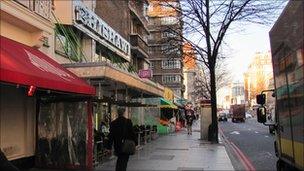Egyptians in London watch and wait
- Published

Edgware Road is the heart of Britain's Arab community
Tens of thousands are protesting in Egypt for a seventh day, defying the start of a new curfew and calling for a general strike. How are the events in Cairo being viewed by London's Arab community?
It is impossible to generalise about the British Egyptian community's reaction to events in Cairo, let alone the wider Arabic community.
"It's like asking what British people thought of David Cameron. There'd be a million different views," says one Egyptian ex-pat in London.
In Edgware Road, the heart of the Arab community in London, there is no doubting the interest in the turmoil in Egypt.
In the cafes, restaurants and shops which proliferate along this small stretch of road - which shoots out north from Marble Arch - the televisions are tuned to al-Jazeera and the Arab-language papers are packed with news and analysis of events in the Arab world's most populous nation.
But it is harder to assess the mood.
Lebanese barbers, Palestinian shopkeepers and Moroccan waiters are reticent and slightly suspicious.
Those who do talk often have divergent opinions.
Demonstrators have turned up every day outside the Egyptian embassy in London
Ahmed El-Mokadem, the founder and patron of the British Egyptian Society, said: "99% of Egyptians in Britain want to see a prosperous, democratic, nationalist country."
But whether that means they all want to see the back of President Hosni Mubarak is less clear.
Ali Amer has been demonstrating every day outside the Egyptian embassy in London's West End and is desperate to see the back of the octogenarian president.
But an Egyptian businessman visiting London, who asked not to be named, disagrees and is dismissive of the protests in Egypt.
"I want all this to end. We don't want to end up like Iraq. These protests will stop when the bread starts running out and people start getting hungry," he said.
He said democracy did not suit the Egyptian psyche which, he claimed, preferred the rule of a strongman, be it a pharaoh, a king or a former air force officer like Mr Mubarak.
"We have been like this for thousands of years and it will be like this until the end of time," he said.
"Mubarak is like my father. If my father was drinking and sleeping with women in front of my mother I would be angry with him but he is still my father and I would still respect him," said Malik.
The news from Cairo dominates the Arabic newspapers
Dr El-Mokadem, an economist, believes the protests on the streets and the reaction of the army are overshadowed by events behind the scenes.
He said he believed the United States holds the key to Egypt's future.
"Without very clear and crisp instructions from the US to go, Mubarak will hold out. Without that he knows he can play them off because the US faces a puzzle," said Dr El-Mokadem.
He said the US was terrified of a new regime in Egypt tearing up the Camp David agreement with Israel and forming a Muslim alliance with Iran.
Dr El-Mokadem fears anarchy and sectarian violence - between Muslims and Egypt's large Coptic Christian minority - if Mr Mubarak leaves a power vacuum.
Bishop Angaelos, the General Bishop of the Coptic Orthodox Church in Britain, said the community in Britain was watching events in Egypt with bated breath, as a lot of people have family there and "it has been quite upsetting".
He told the ≥…»ÀøÏ ÷ he represented 20,000 Egyptian Copts in the UK.
"The fear at the moment is that nobody knows what to expect, everything is up in the air.
"It's great to call for democracy, but if there isn't a process in place to enact that democracy we are left with a void."
The Copt community makes up 15% of the Egyptian population and was targeted recently in a bombing in Alexandra.